Tag Archive: inquiry
August 14, 2013
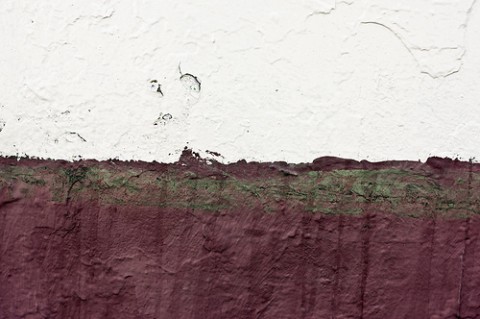
|Image from Lefteris Heretakis|http://www.flickr.com/photos/95935106@N00/3665497225/in/photolist-6zUCC2-6BpvKw-6GGt4g-6GGXZc-6GGYot-6GHhqz-6GHp7H-6GHpp4-6GHqMH-6GLRUo-6GM1BA-6GMkcC-6GMrR7-6GMsPL-6GMtfG-6GMuoE-6TQXh7-6TQYpj-7bbit4-7bbkSv-7bbne6-7bf7K5-cBB2DY-edAhP2-cf78xW-cBAZTs-cBB4id-cBB5wU-9Nzeot-9NC3F5-eNPtU8-dnk5ox-dw5A4n-f7FkSo-a62gzE-9sPsft-b34pnk-dw5Buk-8bqEKN-8bqEMy-8bnotB-8bnowM-8bnoux-8bqEqN-8bnojc-8bqEyf-bG7p8c-8bqEAY-8bnovv-8bqEty-8bnocX|
Last week I had the opportunity to participate in a gathering, convened by the Garfield Foundation, of “network building” practitioners interested in advancing this field for the sake of making more progress around fundamental social change, including greater social equity and sustainable communities. The launch point for our discussions was the successful RE-AMP network that Garfield has supported for several years now in the midwestern United States. We began by looking at a framework for change that has emerged from RE-AMP’s experience, while acknowledging that this is a data point of one. From here we talked about what we are all learning in our respective experiences, and perhaps more importantly, what we do not know. There were several themes that I heard emerging in our conversations, and I wanted to highlight one in this post, which is reflected in the title – how we begin and bound our efforts matters. Read More
March 20, 2013

|Photo by idleformat|http://www.flickr.com/photos/idleformat/2062534673|
An interesting innovation I’ve seen recently in the realm of network building for social change is the creation of what is being called, in one particular system with which I am working, the “Network Support Team.” In the context of what has emerged to this point as an “alignment network” focused on state-wide food system development and addressing community food insecurity, this volunteer team has stepped forward to help “tend to the whole.” It functions much as a good gardener would in her attempts to nurture abundance and flourishing. As this network considers movement into a more action/production-oriented mode, here is how the NST is helping the garden to grow: Read More
January 30, 2013
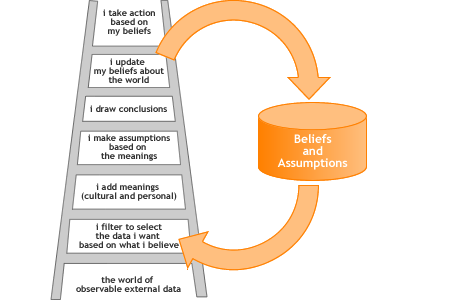
My colleague Cynthia and I are in the midst of delivering IISC’s newest course, Fundamentals of Facilitation for Racial Justice Work, here in Springfield, Massachusetts. Together with a group of dynamic and committed change agents, we are engaged in hands-on exploration of a variety of process and content tools so that we are able to better serve as facilitators towards the ends of racial equity and justice. Part of our discussions today will focus on how we can maintain our center amidst triggering situations and use our identities to advance the work. Read More
January 24, 2013
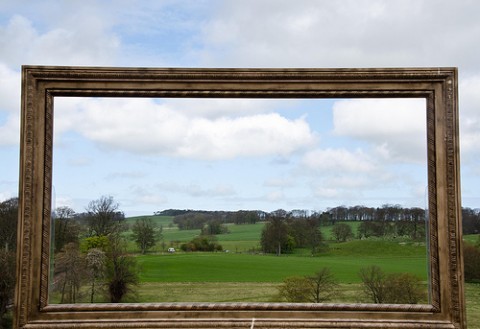
|Photo by Darrel Birkett|http://www.flickr.com/photos/darrelbirkett/6935043394/sizes/m/in/photostream|
I’ve been playing with different reflection questions lately to try and help various networks and multi-stakeholder collaborative change efforts put a clearer and more aligned frame around the kinds of systems (food, education, health, etc.) that would yield more equitable, sustainable, and enriching results. This is not to pretend that they can take control of the systems and command them to be different, but rather to create an image toward which they can nudge these systems via various leverage points. In one recent convening, I borrowed a page from critical systems heuristics, which asks us to identify and play with the existing systemic boundaries, including motivation, power, expertise and legitimacy. Read More
August 15, 2012
“There is a contradiction in wanting to be perfectly secure in a universe whose very nature is momentariness and fluidity.”
-Alan Watts
 Earlier this week I facilitated and participated in a momentous meeting in one of the state-wide change processes I have been involved with for the past few years. This meeting featured community and parent organizers, “service providers,” funders, and other educational advocates from across the state in conversation with newly hired state-level staff charged with creating a plan for ensuring greater alignment of state agencies in the direction of better opportunities and outcomes for all young children. Read More
Earlier this week I facilitated and participated in a momentous meeting in one of the state-wide change processes I have been involved with for the past few years. This meeting featured community and parent organizers, “service providers,” funders, and other educational advocates from across the state in conversation with newly hired state-level staff charged with creating a plan for ensuring greater alignment of state agencies in the direction of better opportunities and outcomes for all young children. Read More
August 14, 2012
This trailer is from a film about the work of dropping kowledge, an initiative in which IISC’s new President, Ceasar McDowell, has been deeply involved. dropping knowledege “invites you to question yourself and the world around you.” “Every time you ask yourself a question, a new dialogue begins,” and dialogue is a step to reclaiming conversation and its outcomes.
August 9, 2012
“Ninety per cent of the world’s woe comes from people not knowing themselves, their abilities, their frailties, and even their real virtues. Most of us go almost all the way through life as complete strangers to ourselves – so how can we know anyone else?”
– Sydney J. Harris
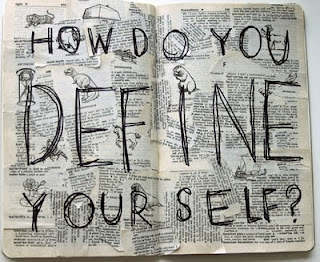
Recently I was in a conversation with an acquaintance who is a real estate agent. We started bantering about houses and communities that would fit our values and lifestyle/family goals. At a certain point, she said, “You know, we can dream all we want, but as we like to say in real estate, ‘buyers are liars.'” In response to my baffled look, she added, “Most people think they know what they want, but I find you really have to take people out into the field, ask a lot of questions, show them a bunch of options, and see how they respond.” Turns out people often end up in a somewhat or completely different place from their originally stated aspirations. Read More
April 6, 2012
“The most sustainable impact comes from our deriving meaning and then connecting that meaning to our purpose, to what we stand for, and to the contributions we make.”
-Dr. Monica Sharma
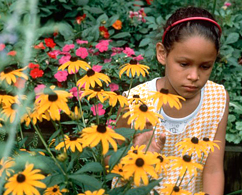
There is something about the invitation to health and wholeness and to talking about how to measure it that seems to be a real draw to our Whole Measures workshop, which we offer jointly with the Center for Whole Communities. I can see it in the eyes of many participants as they walk into the room – “Tell us how!” And there is a bit of a disruptive experience that occurs when we let people know it is not so formulaic. One of my favorite quotes comes from my mentor Carol Sanford who has said, “Best practice obliterates essence,” and I think it really applies to what we are talking about here. Read More
December 22, 2011
“It is my working assumption that the following forty questions must be definitively answered before we may realistically discuss our respective philosophies and grand strategies. . . . ”
—R. Buckminster Fuller

|Photo by Horia Varlan|http://www.flickr.com/photos/horiavarlan/4290549806|
Picking up from yesterday’s post, here is Bucky’s list of 40 strategic questions: Read More
September 29, 2011
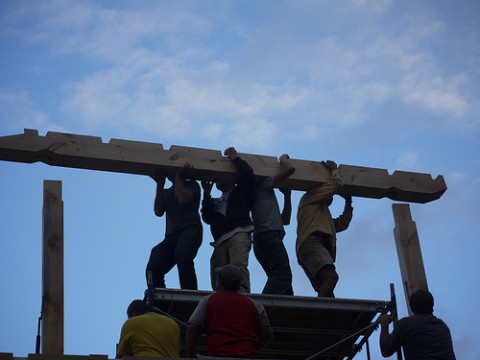
|Photo by grongar|http://www.flickr.com/photos/grongar/4965343939|
Building on yesterday’s post of the video about sociocracy, and inspired by the work of John Buck and Sharon Villines that I mentioned there, I’ve been pulling together a list of ways that leaders at all levels in organizations and networks might encourage more collective self-organizing, self-correcting, resilient and adaptive behavior. Here’s a start and I invite readers to please add: Read More
February 24, 2011
“Give me the listening ear
The eye that is willing to see.”
-Howard Thurman
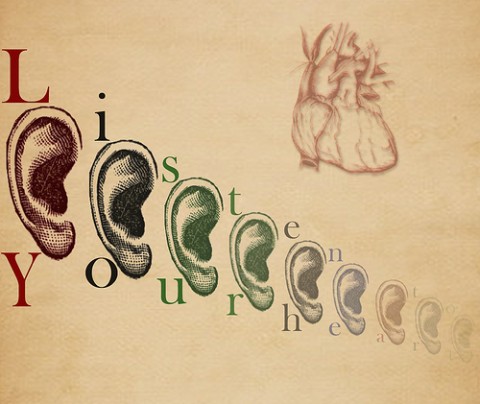
|Image from ky_olen|http://www.flickr.com/photos/ky_olsen/3133347197|
This past weekend I had the opportunity to be part of a Quaker-style “clearness committee” with a few twists thrown in. I have done a few similar sessions in the past, though it has been a while, and once again it proved to be a remarkable experience. The impetus for the session was a friend who, acknowledging that she is at a crossroads in her life and career, reached out for help with discernment. My wife, Emily, and I suggested convening a small group of people who know her well to lovingly listen to the core question with which she is wrestling. Over the course of the two and a half hours we were together, there was an amazing peeling away of layers that occurred as we asked questions and watched for what either brought our friend to life or weighed her down. By the end of the evening, she was excitedly looking at very real and enlivening opportunities in what she had previously perceived as being frivolous or “once I win the lottery” kinds of scenarios. Read More
March 25, 2010
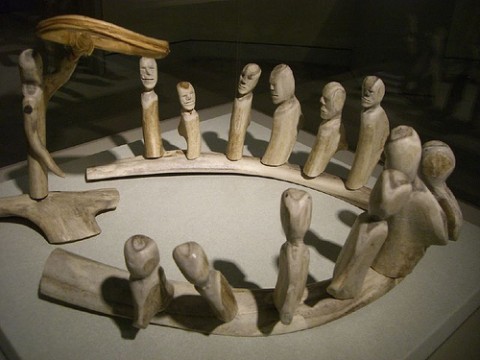
|Photo by jaycross|http://www.flickr.com/photos/jaycross/247126875|
“How do we help people move toward authentic inquiry when their default is aggressive inquisition?” This question was offered up in a tweet by Larry Dressler a week ago and presaged my planned post today. My departure was going to be a return to the work of Marcial Losada mentioned in a previous post, which shows that optimal group performance is attributed in part to members striking a balance between asking questions and promoting their own points of view. Low performing groups tend to get caught up in self-absorbed advocacy. “Aggressive inquisition” can simply be a form of advocacy, intended to attack and tear down other ideas. This is not the spirit Losada is talking about. And yet, it can be challenging for some to avoid simply campaigning for their own proposals.
Read More




 Earlier this week I facilitated and participated in a momentous meeting in one of the state-wide change processes I have been involved with for the past few years. This meeting featured community and parent organizers, “service providers,” funders, and other educational advocates from across the state in conversation with newly hired state-level staff charged with creating a plan for ensuring greater alignment of state agencies in the direction of better opportunities and outcomes for all young children.
Earlier this week I facilitated and participated in a momentous meeting in one of the state-wide change processes I have been involved with for the past few years. This meeting featured community and parent organizers, “service providers,” funders, and other educational advocates from across the state in conversation with newly hired state-level staff charged with creating a plan for ensuring greater alignment of state agencies in the direction of better opportunities and outcomes for all young children. 




